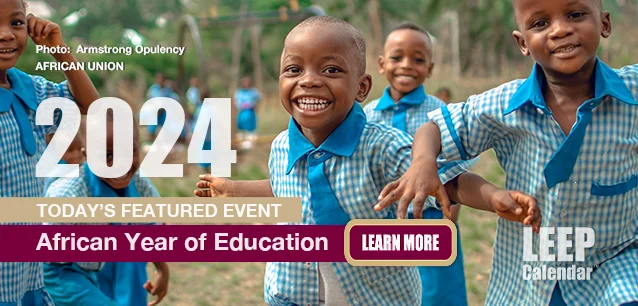 AD
AD
Today is: January 07
Scroll to explore events active on this date.
Additional Events on LEEP
LEEP INK FEATURES

August? Absolutely!
In August, we live through the Dog Days of Summer. It's hot and often humid, and those who can leave for better climates do. Down south, winter is in full force. August is also known as "the ...

In The Heat of July: July 2025 Events
Is it hot enough (or cold enough if you're below the equator) for you yet? There is actually a day for that! Like every month, I pick a diverse collection of events you may or may not know about. This ...

May Blooms: Events in May 2025
Along with October, May is one of the most densely packed months of the year. It's before the summer humidity and the last whole month of the school year. The weather is warming in t...
African Year of Education
Books , Science & Math
Culture & Art , Africa
Ends: Dec 31, 2024
DESCRIPTION:
The African Union designated 2024 as the African Year of Education. In past decades, the continent has struggled to meet the needs of its citizens. Primary and secondary education access remains a significant hurdle, particularly in rural areas. Schools are often far away, leading to long travel distances for students. Lack of transportation and financial constraints compound these problems.
CHALLENGES
Even where schools are accessible, the quality of education may be inadequate. Overcrowded classrooms, poorly trained teachers, lack of materials, and outdated curricula are common challenges. Cultural biases and gender roles can limit educational opportunities for girls. Discrimination, early marriage, and household responsibilities often keep girls out of school, perpetuating gender disparities in education and the workforce. In regions plagued by political turmoil or conflict, schools can be targets, teachers and students can be at risk, and instruction often takes a backseat to immediate survival needs. Finally, health problems, particularly HIV/AIDS and malnutrition, can impair learning ability and attendance.
SUCCESSES
However, Africa has made significant advances in education over the past decade.
Enrollment in primary and secondary schools within multiple nations has increased, boosting enrollment rates significantly. Initiatives to provide free or subsidized education, school meals, and uniforms have contributed to getting more children into classrooms. Programs focused on female education have yielded results in many areas. Scholarships, community engagement, and awareness campaigns continue to bridge educational gender gaps in several countries.
The introduction of technology, including e-learning platforms and mobile education apps, has expanded access to quality education, particularly in remote areas. Collaboration with international organizations and investment by foreign governments continue to support the establishment of new educational institutions, teacher training, and curriculum development. Many nations emphasize vocational and technical training to align education with labor market needs, preparing students for careers in various trades and industries. With community involvement and grassroots initiatives, administrators created new, locally relevant educational programs that enhance access and engagement.
The African Year of Education seeks to raise awareness of the concerted efforts by governments, communities, and international partners to improve and better serve the needs of students now and in the years to come.
Source: Assembly/AU/Dec.864(XXXVI)
VIDEOS
SUPPORTING DOCUMENTS
Currently, this event does not have supporting documents.
ADDITIONAL IMAGES
Currently, this event does not have supporting images.
Where would you like to go now?
 AD
AD


/footer-logo.svg)
